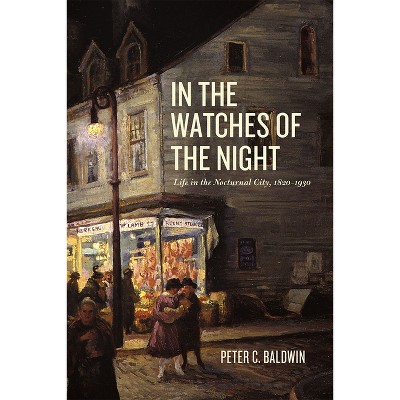Sponsored

Urban Appetites - (Historical Studies of Urban America) by Cindy R Lobel (Paperback)
$24.00
In Stock
Eligible for registries and wish lists
Sponsored
About this item
Highlights
- Glossy magazines write about them, celebrities give their names to them, and you'd better believe there's an app (or ten) committed to finding you the right one.
- About the Author: Cindy R. Lobel is assistant professor of history at Lehman College.
- 288 Pages
- History, United States
- Series Name: Historical Studies of Urban America
Description
About the Book
Cindy Lobel s "Urban Appetities" explores the coevolution of New York City, its politics, and its foodways. Between 1800 and 1890, New York grew from a seaport town with 60,000 residentswhose food came from local farms, waters, and forestsinto a city of 6,000,000, served by an elaborate army of food-sector workers, including regional dairymen and truck farmers, western ranchers, and farmers in the South, the Caribbean, and the Mediterranean. New York became abundant with food and restaurants as never before. Yet its food system was also highly inequitable and notably corrupt. Lobel s focus on the rise of New York as both a metropolis and a food capital opens a unique window onto the intersection of the cultural, social, political, and economic transformations of the nineteenth century. Her perspective provides for fresh consideration of the development of the market economy in New York; the rise of concerns about food quality and access to food; the development of a culture of conspicuous consumption; and the transformation of domestic culinary life. Altogether, Lobel illuminates the ways in which the city s physical and social growth was intimately connected to changes in its food networks."
Book Synopsis
Glossy magazines write about them, celebrities give their names to them, and you'd better believe there's an app (or ten) committed to finding you the right one. They are New York City restaurants and food shops. And their journey to international notoriety is a captivating one. The now-booming food capital was once a small seaport city, home to a mere six municipal food markets that were stocked by farmers, fishermen, and hunters who lived in the area. By 1890, however, the city's population had grown to more than one million, and residents could dine in thousands of restaurants with a greater abundance and variety of options than any other place in the United States. Historians, sociologists, and foodies alike will devour the story of the origins of New York City's food industry in Urban Appetites. Cindy R. Lobel focuses on the rise of New York as both a metropolis and a food capital, opening a new window onto the intersection of the cultural, social, political, and economic transformations of the nineteenth century. She offers wonderfully detailed accounts of public markets and private food shops; basement restaurants and immigrant diners serving favorites from the old country; cake and coffee shops; and high-end, French-inspired eating houses made for being seen in society as much as for dining. But as the food and the population became increasingly cosmopolitan, corruption, contamination, and undeniably inequitable conditions escalated. Urban Appetites serves up a complete picture of the evolution of the city, its politics, and its foodways.Review Quotes
"New York's roots as the world's greatest culinary center are firmly cemented in Cindy Lobel's wonderful survey of the dazzling dining options of the nineteenth century. Her descriptions of markets, dining rooms, restaurants, and kitchens tell us not only what people ate but where they dined and how the city's rich ethnic diversity influenced it all."--Lisa Keller "Purchase College, State University of New York"
"A compelling story. . . . Lobel has written an engaging book about a fascinating subject, and it deserves to be widely read by food historians, New Yorkers, and anyone with an interest in how urban culture has historically shaped food distribution networks."-- "Journal of the Early Republic"
"Lobel's fine book leads us on a fascinating tour of New York's foodways past, letting us explore the farms and markets that supplied kitchens in the city's homes and restaurants and introducing us to men and women who raised food, sold it, cooked it, and ate it."--Ann Fabian, author of The Skull Collectors: Race, Science, and America's Unburied Dead
"Part food and part urban history, Urban Appetites traces New York's simultaneous evolution into a cosmopolitan city, a commercial powerhouse, and, arguably most intriguing to Lobel, an empire of gastronomy."-- "Food, Culture & Society"
"[O]ne snapshot of New York in a century that brought enormous changes in eating and food production.... Through the lens of food, the book surveys changes in the culture, demographics and politics of the city."-- "New York Times"
"Lobel uncovers the 19th-century roots of New York City's claim to be the food capital of the world and its implications of diversity, abundance, and exoticism associated with the rising urban US. . . . The book's best sections cover the growing cultural expectations of urban restaurants in the rise of public culture that serviced specialized clienteles. Recommended."-- "Choice"
"Lobel's accessible cultural history takes us on a fascinating behind-the-scenes tour of New York's food system, covering everything from the provisioning of family kitchens to the emergence of the greatest restaurant scene in the world. Scholars and policymakers have recently recognized that food systems are a key to cultural and environmental sustainability, making this is an ideal time for Lobel's much-needed primer on the historic context for this essential human question. This is a must-read for all who hunger for a better understanding of how cities really work."--Owen Gutfreund "Hunter College, City University of New York"
About the Author
Cindy R. Lobel is assistant professor of history at Lehman College.Dimensions (Overall): 8.9 Inches (H) x 6.0 Inches (W) x .8 Inches (D)
Weight: 1.25 Pounds
Suggested Age: 22 Years and Up
Number of Pages: 288
Genre: History
Sub-Genre: United States
Series Title: Historical Studies of Urban America
Publisher: University of Chicago Press
Theme: 19th Century
Format: Paperback
Author: Cindy R Lobel
Language: English
Street Date: November 3, 2015
TCIN: 1006093490
UPC: 9780226322674
Item Number (DPCI): 247-34-3372
Origin: Made in the USA or Imported
If the item details aren’t accurate or complete, we want to know about it.
Shipping details
Estimated ship dimensions: 0.8 inches length x 6 inches width x 8.9 inches height
Estimated ship weight: 1.25 pounds
We regret that this item cannot be shipped to PO Boxes.
This item cannot be shipped to the following locations: American Samoa (see also separate entry under AS), Guam (see also separate entry under GU), Northern Mariana Islands, Puerto Rico (see also separate entry under PR), United States Minor Outlying Islands, Virgin Islands, U.S., APO/FPO
Return details
This item can be returned to any Target store or Target.com.
This item must be returned within 90 days of the date it was purchased in store, shipped, delivered by a Shipt shopper, or made ready for pickup.
See the return policy for complete information.
Trending Non-Fiction

$15.68
Buy 2, get 1 free select books
4.8 out of 5 stars with 180 ratings

$19.31
was $20.98 New lower price
Buy 2, get 1 free select books
4.1 out of 5 stars with 53 ratings

$19.58
MSRP $29.00
Buy 2, get 1 free select books
4.7 out of 5 stars with 11 ratings

$4.59
MSRP $7.99
Buy 2, get 1 free select books
4.8 out of 5 stars with 116 ratings

$6.20
MSRP $10.95
Buy 2, get 1 free select books
4.8 out of 5 stars with 32 ratings

$7.09
MSRP $9.99
Buy 2, get 1 free select books
4.9 out of 5 stars with 45 ratings





